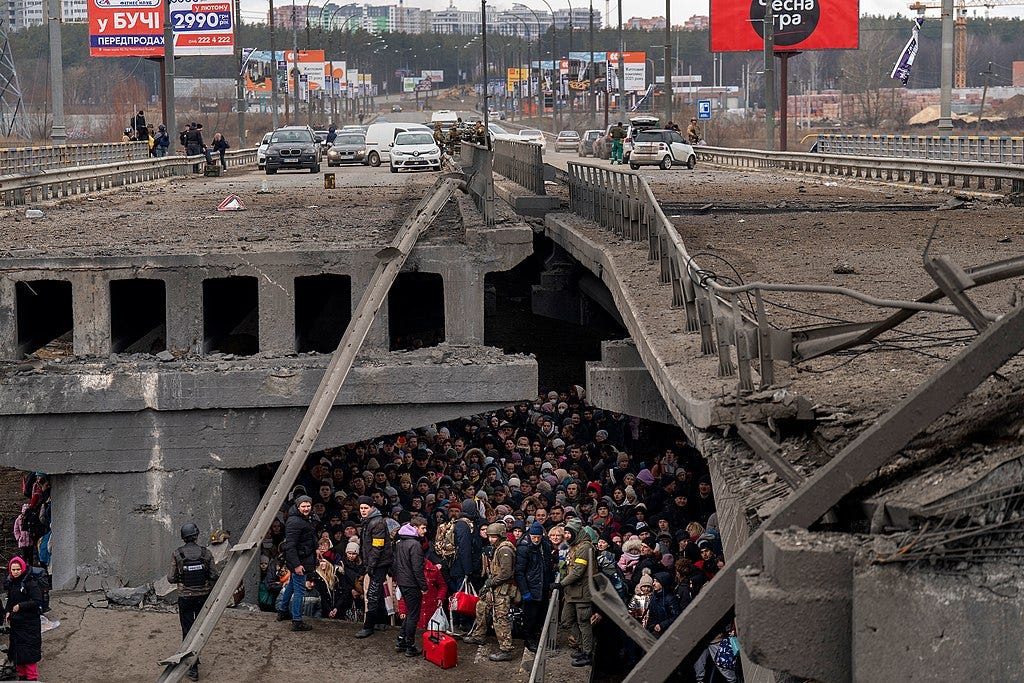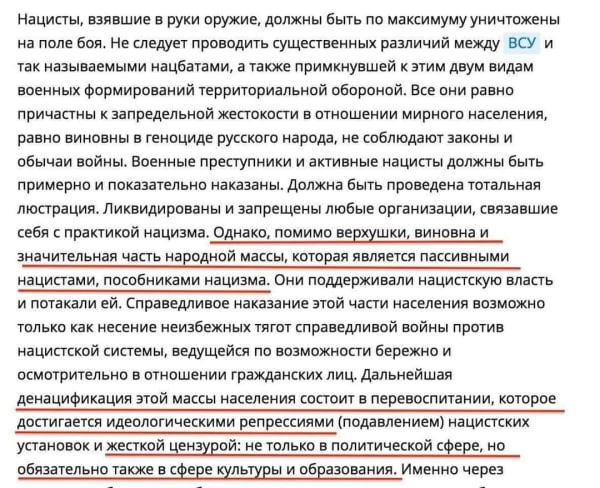The true horror of Bucha consists in offering a sense of the true scale of Mariupol and also of Irpin, of Kharkiv, of Kherson, of Cherniv or of Sumy.
The piling postcards of the carnage seems to have made everybody lose sight but still intuit the importance of what remains the most obvious and still most fundamental of questions about the eventual end of this conflict: What is Putin’s aim in Ukraine?
The images of atrocities in Bucha along with the catalogue of horrors encompassing the bombing of the theater where scores of shelttering women and children were killed or burried alive and the maternity in Mariupol, the shelling of civilian residences across the country, the summary execution of fleeing civilians on streets and roads, the force exiled of captured Ukranians into Russian territory, the abduction of municipal leaders across occupied cities, the destruction of infrastructure recently estimated by the Ukranian government to be over 500 billion euros, the mining of productive fields and the possibly unwitting radiocative contamination by troops disturbing the soil near Chernobyl much like the shelling near the nuclear plant of Zaporizhzhia point, the destruction of hospitals across the country including this one in Zaporizhzhia point in one clear direction and help to settled the question of the aim of Putin’s barbarism in Ukraine beyond any coneivable military objective. The Russian war against Ukraine is not merely a war of aggression but a military project of the Deukranization of Ukraine.
Putin is the final argument in favour of NATO
The need to foreclose NATO’s expansion into Ukraine, an aspiration contained in the Ukrainian constitution since 2019, is one of the arguments offered not only by the Kremlin but by many of its apologists to explain—if not to forthcomingly justify—the invasion and-wittingly or unwittingly—the carnage. Putin—among many other things—has called his invasion a defensive action against NATO. Under current circumstances, the argument seems no more than an anemic excuse.
The idea that the kind of brutality that Ukranians are suffering at the hands of Russians could be construed as a way to foreclose the entry of Ukraine into NATO is simply preposterous. And just as much, to suppose that such viciousness and blind brutality could convince the country, its leaders or its people, that Russia can be relied on or trusted is simply ludicrous. Russia in Ukraine has made itself into the very expression of the darkest forms of evil that history has to offer. Precisely the kind of historical evil against which peoples through their political processes attempt to build security architectures such as NATO.
The more brutal the Russian advance became the more evident it became that a pax Rusa in Ukraine would demand social, political, cultural and ethnic cleansing. The generation that has lived through this destruction could never be expected to embrace its torturers, rapists and murderers. In this regard, Putin’s program would require much more than a Katyn.
Because the hell visited upon the Ukrainian civilian population is bound to be the final argument in favour of NATO and against Russia,the occupation—or liberation, as the Kremlin likes to put it–cannot be bloodless.
Deukranization, a plan
Indeed, the open call for ethnic, cultural, social and political cleansing of Ukraine is surfacing in the Russian public discussion. Timofei Sergeitsev published a more or leess open exhortation of genocide on RIA Novosti, Putin’s state news outlet. He put it plainly:
The punishment recommended by Sergeitsev is straight-forward:
"Further denacification of the mass of the population is to be reached through ideological repression (oppression) of Nazi ideas and through harsh censorship: not only in politics, but in culture and education areas"
Denazification, the Kremlin’s talking point, has become somewhat meaningless given not only the political and ethnic make-up of the Ukranians opposing and resisting Russia but also given the brutality of the Russian aggression with its echoes of the German past. Yet, it is worth considering the meaning of the word, which presumably for the general public has the appeal of ordering the moral nature of putative enemy. Sergeitsev helps to clarify the point and disabuse the Kremlin from its use of the term:
"Denazification is inevitably also deukrainisation – a rejection of the large-scale artificial inflation of the ethnic element of self-identification of the population of the territories of the historical Malorossiya and Novorossiya begun by the Soviet authorities"
In other words, Nazi, in the doctrinal position of the Kremlin and its mouthpieces, is self-assertion and it is on this anxiom that Ukrainian culture, society, politics, aspirations and people are, de facto, nazis.
Ethnic cleansing
Sergeitsev’s article has caused a stir among its international readers and Russia observers. It is hard to say how widespread Sergeitsev’s sentiments are among Putin enablers. What is clear, is that the platform afforded to his call to genocidal violence signals the acquiescence of the Kremlin’s ideological machine.
More importantly, perhaps, is that Sergeitsev’s words are a powerful interpretative key to account for a military operation that turned its fire on the civilian population of Ukraine the moment it reached Ukrainian territory.
The Kremlin has denied responsibility for the attacks in Bucha but then again the Kremlin has also denied plans of an invasion even as they were invading Ukraine and still denies that Russia is conducting a war in Ukraine. The Kremlin Pinnochio doctrine can only ridicule or religious acceptance and nothing in between.
Be that as it may, it is the consistencies of the actions with a plan of cultural, social and political decimation including the thoroughgoing prevarication as a presumed matter of state policy, which give a much stronger indication of what Putin’s plans are than the content of the many incoherent words. In Sergeitsev’s words, that is, indeed, deukranization, the final destruction of Ukraine.






